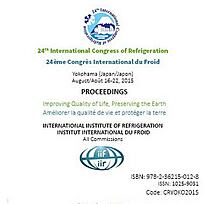
Document IIF
Comment les ondes de chaleur influencent la température intérieure estivale de bâtiments parisiens anciens rénovés.
How heat waves influence indoor temperature during summer in old renovated parisian buildings.
Numéro : pap. n. 304
Auteurs : AZOS-DIAZ K., TREMEAC B., SIMON F., et al.
Résumé
Energy saving policies in the building sector in France have resulted in the implementation of thermal insulation to reduce energy consumption during winter. Nevertheless, old buildings in Paris were built with uninsulated thick walls made of porous materials with high thermal inertia, this property could be affected by the installation of the insulation. Furthermore considering that heat wave periods could become more frequents in future weather, indoor conditions could become intolerable. The thermal measures in old residential buildings must be then assessed. The aim of this study is to evaluate through a thermodynamical model the behavior of two old apartments in Paris, renovated with internal and external insulation. Thermal simulations were performed in EnergyPlus with real and hypothetical weather data of Paris (2 scenarios). Results highlight the impact of thermal isolation position on the thermal behavior of old renovated buildings in summer with indoor temperatures that could reach 28°C.
Documents disponibles
Format PDF
Pages : 8 p.
Disponible
Prix public
20 €
Prix membre*
Gratuit
* meilleur tarif applicable selon le type d'adhésion (voir le détail des avantages des adhésions individuelles et collectives)
Détails
- Titre original : How heat waves influence indoor temperature during summer in old renovated parisian buildings.
- Identifiant de la fiche : 30016149
- Langues : Anglais
- Sujet : Environnement
- Source : Proceedings of the 24th IIR International Congress of Refrigeration: Yokohama, Japan, August 16-22, 2015.
- Date d'édition : 16/08/2015
- DOI : http://dx.doi.org/10.18462/iir.icr.2015.0304
Liens
Voir d'autres communications du même compte rendu (657)
Voir le compte rendu de la conférence
Indexation
- Thèmes : Bâtiments écologiques
- Mots-clés : Chaleur; Immeuble; Simulation; Onde; Été; Isolation; Confort thermique
-
Impact de l'isolation des toitures et du concep...
- Auteurs : HADDEDI I., DAOUAS N.
- Date : 24/03/2016
- Langues : Français
- Source : 1st International Refrigeration, Energy and Environment Colloquium. Proceedings: Hammamet, Tunisia, March 24-27, 2016.
- Formats : PDF
Voir la fiche
-
Development of a camera-based tool to monitor n...
- Auteurs : DONGES J., MORANDI F., PRADA A., CAPPELLETTI F., GASPARELLA A.
- Date : 2022
- Langues : Anglais
- Source : 2022 Purdue Conferences. 7th International High Performance Buildings Conference at Purdue.
- Formats : PDF
Voir la fiche
-
Textile membranes in the built environment.
- Auteurs : MONTEIRO L. M., ALUCCI M. P.
- Date : 16/06/2013
- Langues : Anglais
- Source : Clima 2013. 11th REHVA World Congress and 8th International Conference on Indoor Air Quality, Ventilation and Energy Conservation in Buildings.
- Formats : PDF
Voir la fiche
-
Smart buildings and perceived discomfort in ind...
- Auteurs : PILIPOVÁ I., VILCEKOVÁ S.
- Date : 16/06/2013
- Langues : Anglais
- Source : Clima 2013. 11th REHVA World Congress and 8th International Conference on Indoor Air Quality, Ventilation and Energy Conservation in Buildings.
- Formats : PDF
Voir la fiche
-
Enhancing the energy and non energy performance...
- Auteurs : PENNA P., PRADA A., CAPPELLETTI F., et al.
- Date : 14/07/2014
- Langues : Anglais
- Source : 2014 Purdue Conferences. 3rd International High Performance Buildings Conference at Purdue.
- Formats : PDF
Voir la fiche
